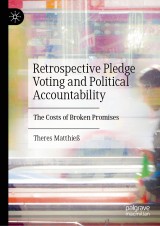Details

Retrospective Pledge Voting and Political Accountability
The Costs of Broken Promises|
128,39 € |
|
| Verlag: | Palgrave Macmillan |
| Format: | |
| Veröffentl.: | 17.08.2024 |
| ISBN/EAN: | 9783031542916 |
| Sprache: | englisch |
| Anzahl Seiten: | 208 |
Dieses eBook enthält ein Wasserzeichen.
Beschreibungen
<p>This book examines retrospective pledge voting; the phenomenon of whether and under which conditions citizens are likely to withdraw their support for political parties that have failed to turn their pre-election pledges into tangible policies once they have joined government. It puts forward a new theoretical framework on retrospective pledge voting. Whilst one would expect voters to punish government parties that have broken their promises by refusing to vote for them at the next election, little research has been done to show whether, and under what contexts, this is actually the case. Adopting a multi-methods approach, the book demonstrates that citizens do punish government parties that have shown a poor performance in fulfilling their election pledges, and that more sceptical citizens with negative pre-existing opinions punish pledge breakage more severely. Bringing together research on election pledges, government performance and voting, the book will appeal to all those interested in democratic representation, politics, public policy, and voter-party linkages.</p>
<p>1. Election pledges, democratic representation and voting.- 2. How pledge performance affects voting.- 3. A threefold empirical investigation of RPV.- 4. RPV at the aggregate level: Evidence from observational data.- 5. RPV at the group level: Evidence from survey data.- 6. RPV at the micro level: Evidence from experimental data.- 7. New evidence on RPV.- 8. A good or bad sign for democracy?.</p>
<p><strong>Theres Matthieß</strong> is Assistant Professor of Empirical Democracy Research at the University of Göttingen, Germany.</p>
<p>This book examines retrospective pledge voting; the phenomenon of whether and under which conditions citizens are likely to withdraw their support for political parties that have failed to turn their pre-election pledges into tangible policies once they have joined government. It puts forward a new theoretical framework on retrospective pledge voting. Whilst one would expect voters to punish government parties that have broken their promises by refusing to vote for them at the next election, little research has been done to show whether, and under what contexts, this is actually the case. Adopting a multi-methods approach, the book demonstrates that citizens do punish government parties that have shown a poor performance in fulfilling their election pledges, and that more sceptical citizens withnegative pre-existing opinions punish pledge breakage more severely. Bringing together research on election pledges, government performance and voting, the book will appeal to all those interested in democratic representation, politics, public policy, and voter-party linkages.</p>
<p><strong>Theres Matthieß</strong> is Assistant Professor of Empirical Democracy Research at the University of Göttingen, Germany.</p>
<p><strong>Theres Matthieß</strong> is Assistant Professor of Empirical Democracy Research at the University of Göttingen, Germany.</p>
Brings together research on election pledges, government performance and voting Develops a new theoretical framework on retrospective pledge voting Shows that citizens punish government parties that fail to fulfill their election pledges

















